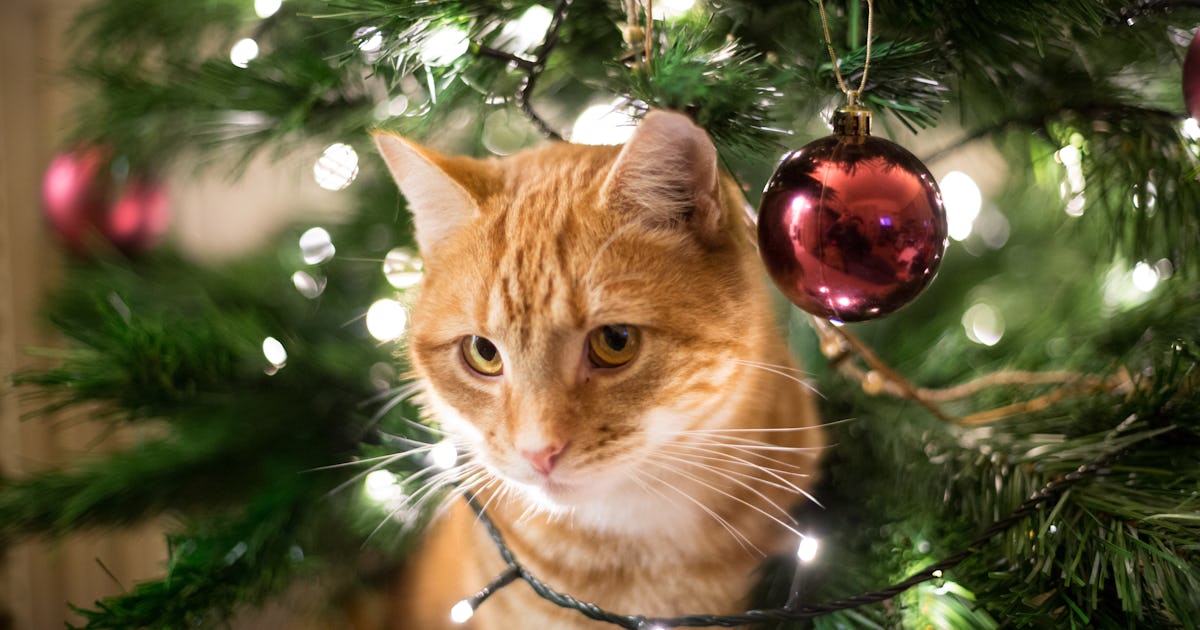What can my pet eat during the holidays? You might be surprised

It’s the most wonderful time of the year — for humans. For our pets, the holidays are a time of unusual amusement and stress as unfamiliar humans gather in their homes for merrymaking.
Amidst all this commotion, it’s easy for naughty pets to dip their paws in treats that are no good for them.
“There are many holiday items that are unsafe for pets to eat,” Victoria Carmella, Director of Veterinary Scientific Affairs at pet food company Blue Buffalo, tells Inverse.
We spoke to pet experts about what your pet can’t eat and how owners can keep their furry friends safe this holiday season.
What should I avoid feeding my pet?
In general: It’s a good idea not to slip your pet leftovers from the dinner table.
“I generally recommend pet parents avoid giving their pets table scraps, as some foods that have health benefits for humans — such as grapes, onions, and raisins — can be toxic to pets,” Carmella says.
Lorraine Rhoads, an environmental biologist for pet daycare company Dogtopia, tells Inverse you should avoid feeding pets sweet treats with artificial sweeteners like Xylitol, which can trigger a sudden drop in blood sugar or liver failure.
“No kissing under the mistletoe for our pets”
While citrus is a common sight around the holidays, you’ll want to keep it out of your pet’s paws.
“Peppermint and citrus can be very toxic to both dogs and cats,” Caroline Wilde, a staff veterinarian at pet insurance company Trupanion, tells Inverse.
Most pet owners are well aware of the dangers of chocolate, but it’s important to be extra cautious around the holidays since guests may bring baked goods to holiday dinners.
“Chocolate is everywhere during the holidays, but make sure not to feed it to your furry friends as it’s toxic due to containing a chemical called theobromine, as well as caffeine,” Carmella says.
According to Wilde, the amount of these compounds varies with the type of chocolate. But bakers’ chocolate is actually the most toxic — making the sweet treat an even bigger concern this time of the year when peppermint bark makes the rounds. Pay attention to signs of hyperactivity, which could indicate chocolate poisoning.
“White chocolate has very little, milk chocolate has more and dark chocolate has the highest levels of the dangerous substance,” Rhoads says.
Alcohol is similarly dangerous for both cats and dogs. Rhoads says you should make sure pets don’t snack on alcohol-laden sweets like fruit cake or rum cake.
“Never share alcohol with your cat. Just a single tablespoon can put your cat in a coma,” Molly DeVoss, a certified feline training specialist who runs the nonprofit Cat Behavior Solutions, tells Inverse.
In general, anything with butter and fat isn’t great for pets. And they should also steer clear of foods in the allium family, like onions, garlic, leeks, and chives.
“Members of the allium family are toxic for dogs and cats — this is a sneaky toxin because it can take a while for symptoms to show,” Rhoads says.
Some items may be appropriate for dogs to eat and unsafe for cats (and vice versa). Keep reading to see which ones to avoid for your pup or feline.
Dogs
“Raisins and grapes can cause kidney failure, so if you suspect your pup has ingested these, take him or her to the vet right away,” Rhoads says.
But there’s a whole slew of holiday items that are toxic to your pups. Keep the following items out of the mouth of your slobbering pup:
Unsafe to eat
- Raisins and grapes
- Bread dough
- Alcohol
- Chocolate
- Caffeine
- Onions
- Garlic
- Leeks
- Chives
- Oranges/Citrus
- Peppermint
Cats
Several items on your holiday plate are toxic and can even be lethal to your kitty.
“Much of our holiday meal is not good for cats to eat; the ingredients are too rich, and some, like onion and garlic, are toxic,” DeVoss says.
Take care to avoid feeding your pet the following items.
Unsafe to eat
- Alcohol
- Oranges/Citrus
- Peppermints
- Caffeine
- Chocolate
- Onions
- Garlic
- Leeks
- Chives
- Potatoes
- Tomatoes
- Milk
- Peppermint
“Potatoes and tomatoes contain the alkaloid solanine, which is lethal to cats,” DeVoss says.
It might be surprising to see milk on this list, but cats are actually lactose intolerant, and it can cause stomach upset.
“Milk is great to leave out for Santa, but not where your cat can get into it,” DeVoss adds.
What can my dog actually eat?
If you want your dog to join in on the holiday celebration, Carmella says that “very small amounts” of bland and low-fat items like carrots should be okay to consume. Apples are great snacks too.
“If something were to drop on the ground, and the pet ate it before you could grab it, lean meat with no bones, lean green beans or carrots would be the safest,” Wilde says.
Brussels sprouts are okay for dogs but can cause flatulence, so beware lest you want to upset your dinner guests. Steamed green beans are fine but avoid creamy green bean casserole. Celery and corn — without the cob — are also fine.
When it comes to starchy sides, plain mashed potatoes and sweet potatoes — without any additives like butter, salt, or brown sugar — are loaded with fiber and vitamins that are healthy for your dog.
If you’re going to feed your dog scraps off the holiday ham or turkey, Rhoads says you should choose lean or white meat. Avoid feeding your dog fatty skin or meat with significant fat or onions, garlic, spices, and salt. Wilde says items like ham or mashed potatoes could cause gastrointestinal inflammation and pancreatitis if they contain butter.
“Stick to wholesome, fresh vegetables and lean meats for treats. If your dog really likes their food, you can always use their own healthy food to positively reward good holiday manners,” Rhoads adds.
What can my cat actually eat?
For a special holiday meal for your cat, DeVoss suggests boiling the giblets, liver, and heart of your holiday bird. Chop them up into a few small pieces for your pet.
“A few bites of turkey is ok too, as long as it isn’t seasoned with onions or garlic,” DeVoss adds.
Which holiday plants are bad for my cat and dog?
Holiday plants are often poisonous to cats and dogs. Avoid keeping these festive plants in your home.
- Poinsettias
- Mistletoe
- Holly
- Amaryllis
- Lilies
“No kissing under the mistletoe for our pets,” Rhodes says.
Mistletoe is unsafe for both cats and dogs to eat due to its toxic properties. DeVoss explains that compounds in the plant — lectins and phoratoxins — affect the heart and cause low blood pressure.
“Mistletoe is actually toxic to both dogs and cats and can cause signs ranging from vomiting and diarrhea to low heart rate and cardiovascular collapse,” Wilde says.
“The main toxin in holly is a group of chemicals called saponins, which can cause vomiting, diarrhea, and lethargy,” DeVoss says.
If you want to keep festive plants around your home without endangering your feline, DeVoss recommends buying a silk version of these flowers — or, even better, getting a planter so you can grow holiday catnip for your pet’s delight.
How else can I keep my pet safe this holiday season?
The dinner table isn’t the only unsafe place for a pet this holiday season. One of the most concerning holiday items is likely sitting in your living room: the Christmas tree.
“If you do have a tree as part of your holiday celebrations, they are quite the treasure trove of mischief to cats,” Wilde says.
Dogs and cats both like to munch on their needles. Cats may also like to climb the tree or pounce on its dangling ornaments like a toy. Wilde says it’s important to secure your tree and keep pets away if needed.
“Depending on the size, there is a risk of your Christmas tree toppling over and hurting your cat or dog,” Carmella says.
“Avoid adding fertilizer to the water in the [tree] base, because if your cat decides to drink the water, the chemicals can be quite toxic,” Wilde adds.
The needles of both real and artificial trees are tempting for cats and dogs. According to Carmella, fir tree oils can irritate your dog’s mouth and cause them to vomit or drool excessively.
“Fake Christmas tree needles can be just as appealing to dogs and cats as real ones, and carry the same risk of physical damage,” Wilde says.
Rhodes adds that tree needles are not digestible and can cause stomach problems if your pet ingests them. Wilde offers four key tips for keeping your pet safe from the Christmas tree:
- Vacuuming and sweeping around the tree regularly
- Wrapping the base in tin foil to deter climbing
- Keeping bigger, fragile items and ornaments out of the cat’s reach
- Avoid using tinsel
Both Wilde and DeVoss say you shouldn’t keep tinsel on your tree if you have a cat since it can cause bowel obstruction. If you suspect your pet has ingested tinsel or ribbon, contact your veterinarian immediately.
“Cats, when given the opportunity, will chew on pretty much anything, so I would keep that in mind in decorating the home and try to keep things out of paw’s reach,” Wilde adds.
Finally, keep an eye out for red flags that your pet has ingested something toxic.
“Signs that your pet ate something poisonous may include vomiting, lack of appetite, lethargy, diarrhea or constipation, and loss of coordination or dizziness,” Carmella says.
For emergencies, you can call the Pet Poison Helpline at 1-855-213-6680 and ASPCA’s Animal Poison Control at 888-426-4435.






